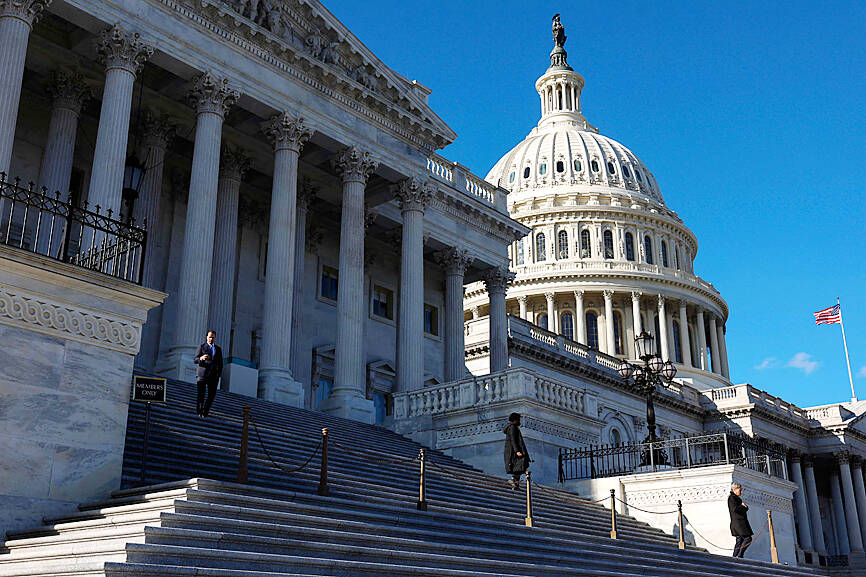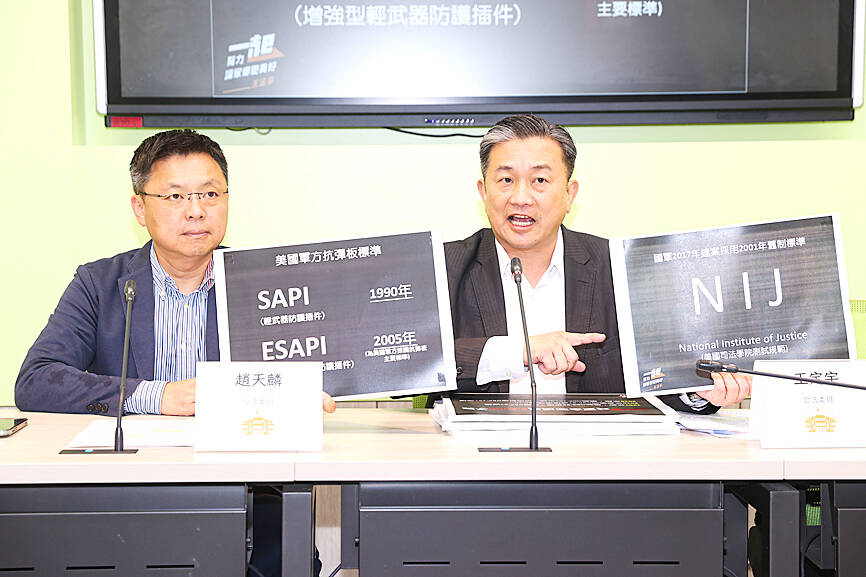The Ministry of Foreign Affairs yesterday thanked the US House of Representatives for advancing the Taiwan International Solidarity Act in a rebuff to Beijing’s claims over the nation.
The bill, which aims to amend the 2019 Taiwan Allies International Protection and Enhancement Initiative (TAIPEI) Act, passed the House by a unanimous voice vote on Tuesday.
The legislation would require the US to support Taiwan’s bids to join international organizations as specified under the TAIPEI Act and oppose attempts by Beijing to “resolve Taiwan’s status by distorting the decisions, language, policies or procedures” of such organizations.

Photo: AFP
The bill states that UN Resolution 2758 — which recognized the People’s Republic of China as the sole legitimate government of China in 1971 — does not apply to Taiwan.
“The resolution did not address the issue of representation of Taiwan and its people in the United Nations or any related organizations, nor did the resolution take a position on the relationship between [China] and Taiwan or include any statement pertaining to Taiwan’s sovereignty,” it said.
“The United States opposes any initiative that seeks to change Taiwan’s status without the consent of the [Taiwanese] people,” the bill added.

Photo: CNA
The bill must still be approved by the US Senate, and then signed by US President Joe Biden before it can become law.
The Ministry of Foreign Affairs said in a news release that Taipei welcomed the US House’s advancement of a bill that could help counter China’s malign efforts to thwart Taiwan’s participation in international organizations.
Beijing over the past decades has repeatedly invoked Resolution 2758 as a means to prevent Taiwan from participating in and contributing to the international community in a distortion of the resolution’s purpose, which was concerned solely with China’s legal representation, it said.
The Chinese Communist Party’s “one China” principle is based on Beijing’s false interpretation of the resolution and the lies it made to the international community, the ministry added.
The ministry thanked the friends of Taiwan across the political divide in the US Congress, saying that Taiwan would continue its collaboration with the US and other like-minded countries in overcoming shared global challenges.
Democratic Progressive Party (DPP) Legislator Wang Ting-yu (王定宇) said the bill was a clear signal to the international community that Resolution 2758 should not be applied to Taiwan.
Promoting this fact would allow the nation to create a legal foundation for Taiwan to achieve membership in international organizations and normal interactions with global political actors, he said.
The US House’s passage of the Taiwan International Solidarity Act shows that an unprecedented level of support for the nation’s bid to join the UN exists in Washington, DPP Legislator Chao Tien-lin (趙天麟) said.
Chinese Nationalist Party (KMT) Legislator Charles Chen (陳以信) said the bill’s importance should not be overplayed, as the Taiwan-US relationship continues to be largely governed by the same legal framework as before.
Although the importance of the bill is more symbolic than substantial, the KMT still welcomes and appreciates the US Congress’ expressions of goodwill, Chen said.

ENDEAVOR MANTA: The ship is programmed to automatically return to its designated home port and would self-destruct if seized by another party The Endeavor Manta, Taiwan’s first military-specification uncrewed surface vehicle (USV) tailor-made to operate in the Taiwan Strait in a bid to bolster the nation’s asymmetric combat capabilities made its first appearance at Kaohsiung’s Singda Harbor yesterday. Taking inspiration from Ukraine’s navy, which is using USVs to force Russia’s Black Sea fleet to take shelter within its own ports, CSBC Taiwan (台灣國際造船) established a research and development unit on USVs last year, CSBC chairman Huang Cheng-hung (黃正弘) said. With the exception of the satellite guidance system and the outboard motors — which were purchased from foreign companies that were not affiliated with Chinese-funded

PERMIT REVOKED: The influencer at a news conference said the National Immigration Agency was infringing on human rights and persecuting Chinese spouses Chinese influencer “Yaya in Taiwan” (亞亞在台灣) yesterday evening voluntarily left Taiwan, despite saying yesterday morning that she had “no intention” of leaving after her residence permit was revoked over her comments on Taiwan being “unified” with China by military force. The Ministry of the Interior yesterday had said that it could forcibly deport the influencer at midnight, but was considering taking a more flexible approach and beginning procedures this morning. The influencer, whose given name is Liu Zhenya (劉振亞), departed on a 8:45pm flight from Taipei International Airport (Songshan airport) to Fuzhou, China. Liu held a news conference at the airport at 7pm,

GRIDLOCK: The National Fire Agency’s Special Search and Rescue team is on standby to travel to the countries to help out with the rescue effort A powerful earthquake rocked Myanmar and neighboring Thailand yesterday, killing at least three people in Bangkok and burying dozens when a high-rise building under construction collapsed. Footage shared on social media from Myanmar’s second-largest city showed widespread destruction, raising fears that many were trapped under the rubble or killed. The magnitude 7.7 earthquake, with an epicenter near Mandalay in Myanmar, struck at midday and was followed by a strong magnitude 6.4 aftershock. The extent of death, injury and destruction — especially in Myanmar, which is embroiled in a civil war and where information is tightly controlled at the best of times —

Taiwan was ranked the fourth-safest country in the world with a score of 82.9, trailing only Andorra, the United Arab Emirates and Qatar in Numbeo’s Safety Index by Country report. Taiwan’s score improved by 0.1 points compared with last year’s mid-year report, which had Taiwan fourth with a score of 82.8. However, both scores were lower than in last year’s first review, when Taiwan scored 83.3, and are a long way from when Taiwan was named the second-safest country in the world in 2021, scoring 84.8. Taiwan ranked higher than Singapore in ninth with a score of 77.4 and Japan in 10th with